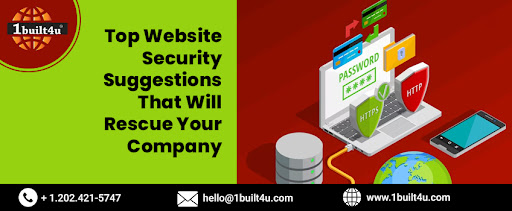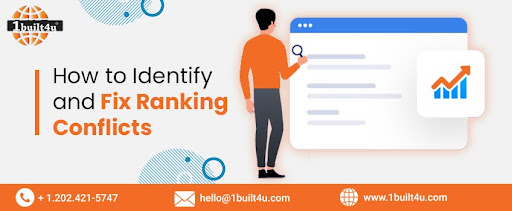
Top Website Security Suggestions That Will Rescue Your Company
Security on websites must be taken seriously. The accumulation of SEO results that make your website highly competitive can take months or even years. And if a hacker manages to gain access to your website in any way, they can erase all of that in a matter of seconds! Although this is admittedly rare, the alternative is even worse. After all, most hackers don't just want to crash websites - they also want to steal private information. You might not even be aware that you were hacked because this is something that can be difficult to find. Our digital marketing company in Ashburn USA has compiled a list of the best website security tips to safeguard your business to avoid all of this.
Your Client's Information is Secured
Encrypting your website's data at all times is the first of our top website security tips. This necessitates installing an SSL Certificate in addition to enabling HTTPS. Any data transferred between a server and a client, such as your website and a user's browser or email, is effectively encrypted by this. This is critical for all businesses, but it is especially critical for eCommerce businesses, as any competent digital marketing agency can attest. Without this protection, running an online store could easily be disastrous for both you and your customers.
Utilize Double Authentication
Double authentication frequently results in a slight delay and can appear to be inconvenient. All things considered, having to both recollect a secret word and bring a code from your email or telephone is irritating. Not to mention that many of them are very poorly timed, and even a delay of ten seconds would require sending a new code. Nevertheless, this is without a doubt one of the best options available for safeguarding website access. A hacker will absolutely not be able to enter your website unless they have access to one of your employees' phones or email.
Avoid Brute Force Techniques
You should also ensure that you are protected from the majority of hacking techniques known as "brute force." They merely rely on your website being overloaded with login attempts. There are two ways to prevent this from happening. Human authentication is the first option. This ensures that no bots are attacking your website and consuming valuable resources. Imposing a timer on everyone who fails to log in before they can attempt again is the second approach that frequently yields results in solving this problem. Your website server won't crash if people can only attempt to access it once every fifteen seconds.
Get A Security Plugin And A VPN
Finding a WordPress security plugin you like is one of our most important final website security tips. Any reputable digital marketing company will tell you that there is no such thing as a "perfect" plugin. Simply select one that meets your requirements and budget. However, there are a number of contenders for the title. Some examples include Wordfence, Jetpack, Sucuri, and All in One WP Security & Firewall. Billing is handled differently by each, and security is handled differently by some as well. As a result, before settling on any one, check out all of your options.
Make Sure Your Plugins Are Up-to-Date
Keep in mind that even if you only install reputable plugins with decent security, there is still a risk to consider for digital marketing services: updates to versions. The sole purpose of plugin updates is not simply to enhance the plugin's functionality. They are frequently carried out in addition to enhancing their security. Even if security is not the primary focus of the update, developers pay significantly less attention to code security in older versions. This means that hackers could eventually use outdated updates as backdoors into your website if you are behind on them. This is one of the dangers that web design companies like to warn their clients about, especially if their websites contain any plugins.
Take Email Security Very Seriously
It is almost as bad as someone hacking your website to get into your email. They can cause a lot of problems by simply asking to retrieve a password that has been forgotten. They would unquestionably have access to your website as well if you do not have two-step authentication that requires a mobile device. Together with any and all accounts you've signed up for with your email address. In addition, they would be able to steal all private correspondence and data.
Always Keep Backup Copies of Your Website's Data
This is the final of our top website security tips. There will be two uses for this. First, many plugins offer passive backup scanning for malware and other potentially harmful tricks. Second, if the worst happens and your website is hacked, you can use the backup to quickly restore your data. Another thing to keep in mind is that our digital marketing services will typically advise you to keep backups as well because backups make it much simpler to manage SEO content in the event of a hack or simple editing issues.
Why Website Security is Important
Website security is of paramount importance in today's digital landscape. With the increasing number of cyber threats and data breaches, ensuring the security of your website is essential for several reasons:
1) Protecting User Data: Websites often collect and store sensitive user information such as names, email addresses, passwords, and payment details. If your website lacks proper security measures, it becomes vulnerable to hackers who can gain unauthorized access and steal or misuse this valuable data. By prioritizing website security, you protect the privacy and trust of your users.
2) Safeguarding Business Reputation: A security breach can severely damage your business's reputation. If customer data is compromised or your website is hacked, it can lead to negative publicity, loss of customer trust, and potential legal repercussions. Demonstrating a commitment to website security instills confidence in your customers, clients, and partners, and helps maintain a positive brand image.
3) Preventing Financial Loss: Cyberattacks can have significant financial implications for businesses. Recovering from a security breach can be costly, involving expenses such as investigating the incident, remediation efforts, legal fees, and potential fines. Moreover, downtime resulting from an attack can lead to lost revenue, disrupted operations, and damage to your bottom line. Implementing robust website security measures helps mitigate these financial risks.
4) Ensuring Website Availability: Attacks like Distributed Denial of Service (DDoS) can overwhelm your website's resources, causing it to become unavailable to users. This downtime can lead to a loss of customers and revenue. By implementing security measures, such as firewalls and intrusion detection systems, you can mitigate the risk of such attacks and ensure the continuous availability of your website.
5) SEO and Search Engine Ranking: Search engines prioritize website security when determining search rankings. Websites with SSL certificates (HTTPS) and secure connections receive a ranking boost. On the other hand, insecure websites may receive warnings or penalties, negatively impacting their visibility in search results. Investing in website security not only protects your website but also helps maintain or improve your search engine ranking.
Conclusion
We trust that utilizing our definitive website security tips that will safeguard your business will allow you to keep away from all possible issues connected with hacking. Don't worry if something does occur. You will simply be required to restore your website using your backup in the worst-case scenario. Naturally, the stolen data and downtime are more difficult to replace. For more information, visit 1built4u.com .





